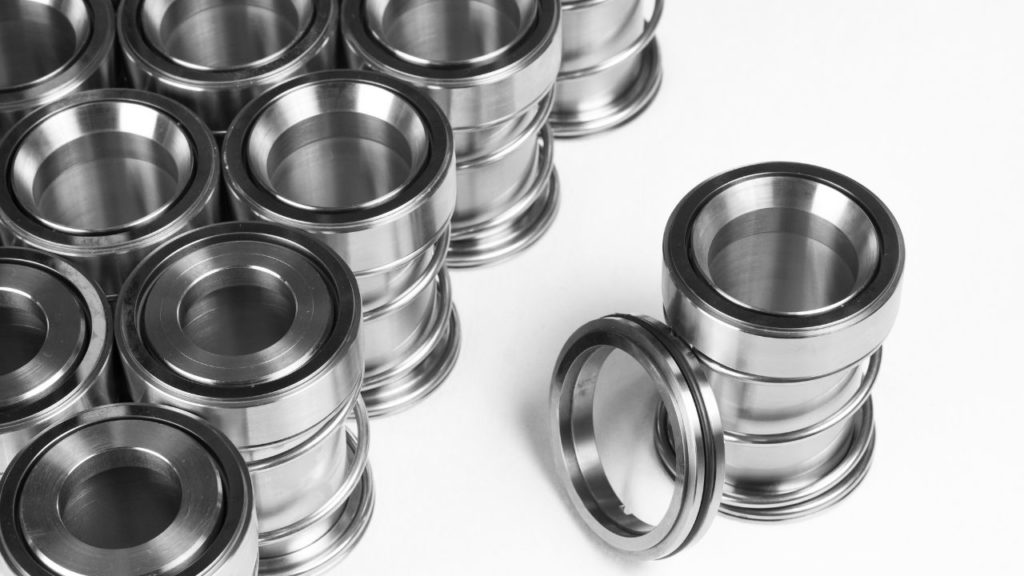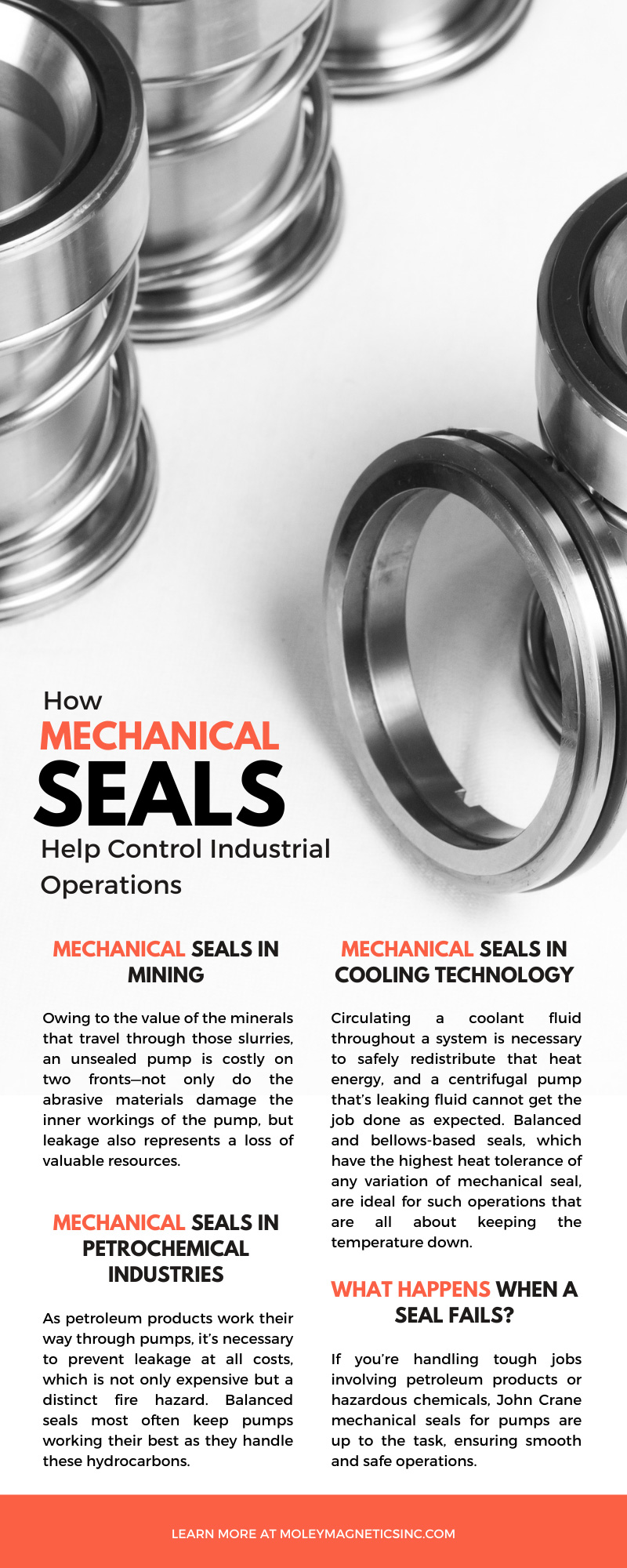
How Mechanical Seals Help Control Industrial Operations
It’s hard to imagine successful industrial processes without centrifugal pumps. By applying rotational force to a contained fluid, a centrifugal pump gives low-viscosity fluid some high traffic. Fluids as varied as water, solvents, coolants, acids, low-viscosity oils, and wastewater slurries all travel from Point A to Point B by way of a centrifugal pump.
Perusing this list of fluids, with its flammable oils, caustic acids, expensive coolants, and toxic waste products should give you pause. What if a pump should fail and open a system in the wrong place? The rupture of a failed pump could be much more than an incident for your cleanup crew—it could turn into a catastrophe.
Pumps have many parts, but when it comes to keeping pumps running safely, there’s one in particular that deserves special attention. When fluids need to stay in their systems for purposes of safety and efficacy, it’s the firm grips of mechanical seals that keep everything in place. This indispensable part of the centrifugal pump can be the difference between smooth operations and outright disaster. We’ll take a closer look at how mechanical seals help control industrial operations—particularly some challenging ones—and what you can do to make sure your own operations aren’t in danger of failing.
What Is a Mechanical Seal?
A mechanical seal is a device that connects to the rotating shaft of a pump—most often a centrifugal pump. Like any type of sealing, from the adhesive you lick on your envelopes to industrial-scale processes, a mechanical seal has two jobs: to keep what’s in the system in and keep what’s outside the system out. Within a pump, a mechanical seal keeps the fluid from leaking around the impeller shaft and into the rest of the pumping mechanism. In the other direction, a mechanical seal is equally useful for keeping outside contaminants out of the fluid. Oils, sediments, and other adulterants can compromise the integrity of the fluid, which could render it useless under exacting standards for quality control.
The Different Types of Mechanical Seals
We’ll cut your imagination short before it gets out of hand—none of the types of mechanical seals we’ll be looking at are robotic Arctic pinnipeds. Nonetheless, the variations among mechanical seals in pumps are notable enough to warrant a closer look. Mechanical seals can be balanced, in which both the diameter and the shoulder of the seal receive equal pressure, or unbalanced, in which force is not evenly distributed between diameter and shoulder. Unbalanced seals are a more cost-effective choice but also more prone to failure, making them an inopportune choice for costly and flammable hydrocarbon applications such as natural gas or petroleum derivatives. Balanced seals provide less heat generation, a longer lifespan, and higher stability against disruptive vibrations.
Another distinction between mechanical seals lies in whether they employ springs to keep seals tightly locked into place. Seals that do incorporate springs, better known as pusher seals, are best suited for high-pressure applications such as pressurized gases. Non-pusher seals, which lack springs, rely instead on a metal or elastomer bellows, which expands and contracts to ensure sufficient force upon the seal. These bellows-based seals are the ideal choice for high-temperature fluids, as well as low-viscosity slurries or abrasives.
These categorizations compose two axes—both balanced and unbalanced seals can come with or without springs. This effectively separates most mechanical seals into four major groups. Having gained a better understanding of the different types of mechanical seals and where they best come into play, here are some common applications of mechanically sealed pumps and how they keep challenging industrial processes fully operational.
Mechanical Seals in Mining
When laypeople imagine the mining industry, they’re likely to picture spelunkers with flashlights on their hard hats, digging away in caves to harvest valuable ores. Today’s mining industry is a highly sophisticated operation involving slurries to transfer materials through piping. Owing to the value of the minerals that travel through those slurries, an unsealed pump is costly on two fronts—not only do the abrasive materials damage the inner workings of the pump, but leakage also represents a loss of valuable resources.
Mechanical Seals in Petrochemical Industries
The keyword in petroleum is “flammability.” The pumps that operate in oil refineries and other petrochemical concerns deal with high heat and flammable fluids. As petroleum products work their way through pumps, it’s necessary to prevent leakage at all costs, which is not only expensive but a distinct fire hazard. Balanced seals most often keep pumps working their best as they handle these hydrocarbons.
Mechanical Seals in Cooling Technology
Working with hydrocarbons isn’t the only place where you’ll experience high heat. The motors and heavy machinery throughout the industrial sector generate a great deal of excess heat, which can be dangerous to sustained operations. In response, centrifugal coolant pumps reduce the risk of overheating by transferring that excess energy away from operations, keeping the temperature of sensitive technology within acceptable parameters. Circulating a coolant fluid throughout a system is necessary to safely redistribute that heat energy, and a centrifugal pump that’s leaking fluid cannot get the job done as expected. Balanced and bellows-based seals, which have the highest heat tolerance of any variation of mechanical seal, are ideal for such operations that are all about keeping the temperature down.
What Happens When a Seal Fails?
Understanding how mechanical seals help control industrial operations means that replacing a failing or failed mechanical seal promptly and effectively is imperative. Just as we do with electromagnets, Moley Magnetics has what you need. Moley Magnetics has partnered with John Crane, the industry leader in mechanical seals for industrial pumps, to provide a full complement of their products for varied industrial processes. If you’re handling tough jobs involving petroleum products or hazardous chemicals, John Crane mechanical seals for pumps are up to the task, ensuring smooth and safe operations. Even hobbyists and home-repair enthusiasts who are up to something in the basement, garage, or tool shed can benefit from John Crane seals to keep their project going.


